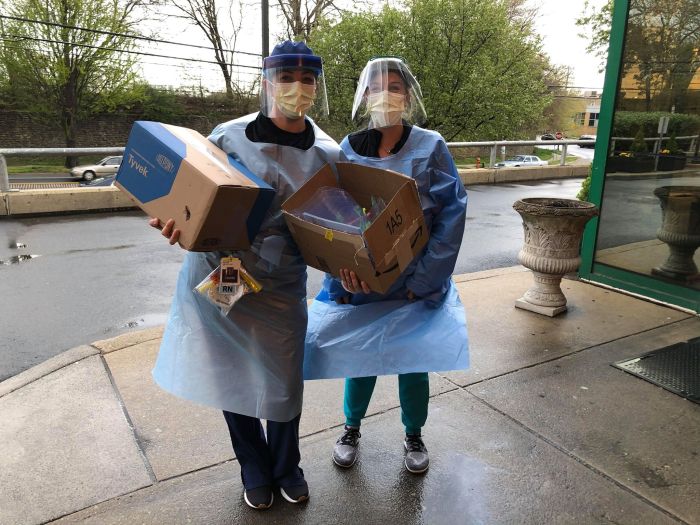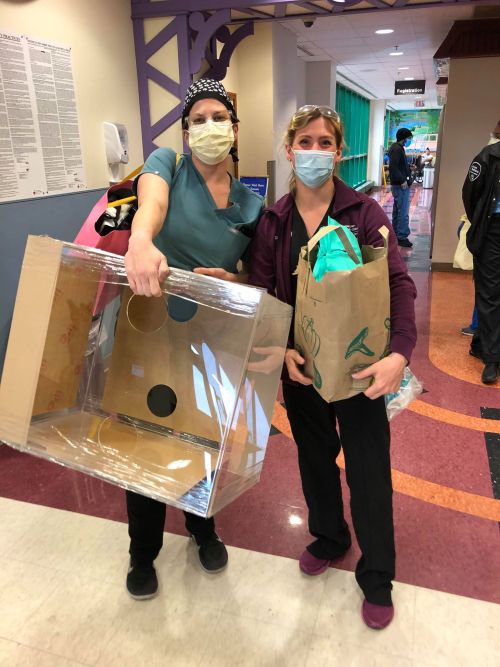Class of 2021 Graduates Have an Impressive Record of Service
May 19, 2021
By Lisa Ryan
The College of Medicine’s Class of 2021 rose to the challenges presented by the COVID-19 pandemic by serving the community. They graduate this week having provided over 15,000 hours of community service through curricular and non-curricular activities during their time at the College of Medicine.
When in-person learning was suspended in spring 2020, to best protect students’ health and safety amid the COVID-19 pandemic, MD Program and graduate students got creative to stay busy and help meet community members’ needs.

“I think there’s a cohort of the Class of 2021 who are very heavily involved in community service,” said Nicki Bernstein, MD Program Class of 2021. “Medical students had 12 weeks in our third year where we were out of clinical rotations, so there were many more opportunities for people to find their niche and start projects.”
Bernstein said that not only did some students find more time in their schedules to participate in non-curricular community service after other activities were suspended, but that students across the board were also driven to meet societal needs brought into the spotlight by current events.
During nationwide demonstrations against anti-Black racism following the murder of George Floyd, Bernstein and other medical students helped raise money for Black Lives Matter and acted as street medics during local protests.
“I think a lot of issues that have always been present in society were in the spotlight during the last year, and it opened up opportunities for students to help address those issues in different ways,” she said. “It’s amazing that the Class of 2021 completed so many service hours in our final year of school, but it’s also unfortunate that there was so much need and so many gaps for us to help fill.”

Edward Guo, MD Program Class of 2021, helped form a student-run task force last spring to address a national personal protective equipment (PPE) shortage and combat misinformation about COVID-19 on social media.
Interdisciplinary Health Sciences Program student Shayna Zanker, Class of 2021, turned her pandemic-induced change of plans into an opportunity to help her community. After returning home to Connecticut last spring to help high-risk family members navigate the pandemic, Zanker gave out badges displaying a health care provider’s name and a smiling photo; when the provider wore the badge, their patients could better connect with the person under the PPE.
Other students helped staff the Philadelphia COVID-19 hotline, volunteered at COVID-19 testing sites, and administered hundreds of vaccines.
Students worked in the last year not only to fill newly-highlighted gaps, but also to continue meeting community needs in areas like children’s literacy and physical health, overdose reversal and harm reduction, and more.
Community engagement is core part of the College of Medicine curricula because it helps students develop cultural competency and enables them to best address barriers to health faced by underserved populations. For many students, a passion for service inspires them to go above and beyond the community engagement hours required to complete their program.
To Bernstein, who will be an internal medicine resident at the University of California, Davis, community engagement was a crucial part of her medical education and preparation for her career.
“For me, service is imperative to develop cultural competency, and to understand where my patients are coming from and their backgrounds to provide more holistic care,” she said. “When that happens, you have a more symbiotic relationship with the patient and they’re able to participate in their care, as opposed to there being an imbalance of power.”
During curricular service in her first year of medical school, Bernstein discovered a passion for helping kids in need. At the end of the year she helped found the Kelly Readers program, in which MD Program students work with kids at John B. Kelly Elementary School to develop their academic and social skills. She is still involved with the program, which first- and second-year MD Program students can choose as a curricular volunteer site.
Bernstein said she often recruited friends to join her in this and other service projects.
“It’s useful and powerful to have more hands on deck, and I always had a positive experience reaching out to people,” she said. “It wasn’t hard to find someone who wanted to get involved.”
Many students bring with them to the College of Medicine a longtime passion for community engagement. Guo was no exception, volunteering at the Chinatown Clinic at Holy Redeemer Church and School prior to the start of his medical education.
Throughout his time in the MD Program, Guo has continued applying his knowledge of Mandarin Chinese and his interest in health care to volunteer work at the free, weekly walk-in clinic. Guo helped patients check in to receive health care and also provided interpretation during their appointments.
He said his experiences in Chinatown will help make him a better provider for underserved patients as an emergency medicine resident at Cooper University Hospital in Camden, NJ, and throughout his medical career.
“Many patients at the clinic are immigrants to the United States who may be facing financial hardship and who may speak little or no English, so they’re scared,” Guo said. “They have nowhere else to turn for their medical care. You can only imagine the relief when these patients finally meet someone in health care who can speak their language.”